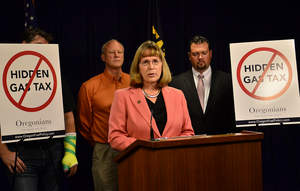SALEM, OR--(Marketwired - Sep 17, 2014) - Higher costs resulting from the state's proposed Low Carbon Fuel Standard would function as a "hidden gas tax," posing major consequences for small businesses and hitting working Oregonians the hardest, state officials and small-business owners said Tuesday.
"We oppose this policy because it represents nothing more than a hidden gas tax on Oregonians," state Rep. Gail Whitsett said during a Tuesday press conference organized by Oregonians for Sound Fuel Policy at the Capitol. "A hidden gas tax will hurt our small businesses, jobs and all Oregonians who depend on transportation in their daily lives."
The conference came during legislative days, when lawmakers home in on issues for the upcoming session. Oregonians for Sound Fuel Policy, a coalition of consumers and business groups who want to reduce global warming and ensure cleaner air but are concerned about cost impacts and broader economic consequences for those who live and work in the state, announced intentions to make opposing the hidden gas tax its No. 1 priority when lawmakers convene in early 2015.
Whitsett, a member of the House Energy and Environment Committee, said she's heard from an increasing number of Oregonians concerned about the hidden gas tax. The proposed Low Carbon Fuel Standard would act as one because it relies on the blending of advanced biofuels that aren't available in commercial quantities; as a result, the fuels industry would have to purchase credits from others to buy its way into compliance.
"It's basic economics that mandating demand for products in limited supply will lead to higher costs," Whitsett said.
An economic impact study by Charles River Associates suggests the law could cost the average family up to $1,280 per year. The same study also shows it could result in the loss of as many as 29,000 jobs in the state.
The Boston Consulting Group has found that the program, if implemented, would raise fuel costs by between 33 cents and $1.06 per gallon.
That's a concern of Matt Miller, general manager of family-owned Gresham Sanitary Service.
While supporters of the proposed LCFS claim it would reduce fuel costs by forcing people to switch to alternative fuels, that's easier said than done, Miller said.
He's already taken steps to convert his fleet to natural gas. His company recently landed an award from the Clean Cities Coalition for showing leadership in switching to cleaner burning fuels.
"But we can only move so fast," Miller said. "Imposing higher fuel costs on small businesses like mine would serve as a disincentive to those of us who are trying to do the right thing."
Joe Squires of Portland-based Squires Electric agreed. Oregon is already a leader in reducing carbon emissions, he explained, and businesses have played a role because they've achieved energy efficiencies without any new regulations.
"If it makes business sense, then businesses will seek it out to reduce costs," said Squires, noting his company has multiple electric vehicles in its fleet. "Rather than pushing expensive new regulations such as this, the state should focus on programs that are actually proving to work."
Carl Harbaugh with Southtown Glass in Salem said companies like his are already operating on razor-thin margins, and any uncertainty in long-term costs could cause problems big enough to put some out of business.
"With a small margin, it could upset the apple cart big time," he said.
Jan Meekcoms, state director for the National Federation of Independent Business, said the Low Carbon Fuel Standard will remain an important issue for small businesses throughout Oregon in the coming year.
The LCFS proposal first appeared in 2009, when the Legislature approved a bill allowing the Department of Environmental Quality to adopt rules for a Low Carbon Fuel Standard. At the time, lawmakers included a sunset provision requiring another vote of the Legislature to continue the program beyond 2015, allowing officials to evaluate the program, its economic impacts and potential environmental effects before making it permanent.
While legislators have so far refused on a bipartisan basis to extend the sunset, the governor has asked DEQ to proceed with the program regardless.
Meekcoms called on lawmakers to use their time to find better solutions that balance the environment and economy.
"Oregonians and small businesses simply can't afford to pay more," she said. "It's a mistake for our state government to implement a policy that would put our economy at risk."
About Oregonians for Sound Fuel Policy:
Oregonians for Sound Fuel Policy is a coalition of consumers and business groups who want to reduce global warming and ensure cleaner air but are also concerned about cost impacts and broader economic consequences for those who live and work in the state. Details: http://www.oregonfuelpolicy.com
Contact Information:
Contact:
Kara Hansen
503-274-8886

